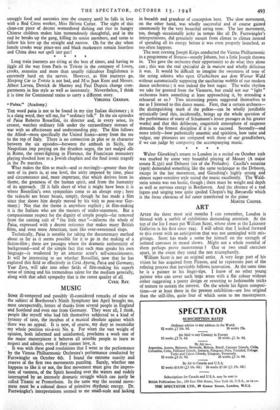Paisa." (Academy.)
THE word paisa is not to be found in my tiny Italian dictionary ; it is a slang word, they tell me, for "ordinary folk." In the six episodes of Paisa Roberto Rossellini, its director and, in every sense, its creator, watches ordinary folk under the extraordinary stresses of war with an affectionate and understanding pity. The film follows the Allied—more specifically the United States =army from the toe to the top of Italy. There is no connection in plot or in character between the six episodes—between the ambush in Sicily, the Neapolitan imp preying on the drunken negro, the tart malgre elle in Rome, the street-fighting in Florence, the Franciscan monastery playing shocked host to a Jewish chaplain and the final ironic tragedy in the Po marshes.
What makes the film so much—and so movingly—greater than the sum of its parts is, at one level, the unity imposed by time, place and circumstance and, more important, that which derives from its theme, the greatness of the human spirit, and from the humanity of its approach. (If it falls short of what it might have been it is where Rossellini's own sympathies come to an abrupt stop ; here the tedeschi are brute beasts, simply, though he has made a film since that shows him deeply moved by his visit to post-war Ger- many.) Not that the theme is anywhere explicit ; in film-making it -is the Italians who are the masters of under-statement. But a compassionate respect for the dignity of simple people—far removed from the canting cult of " the little man "—informs the whole of Paisa, expressed with a decent reticence thdt makes many British films, and even more American, taste like over-sweetened slops. Technically, Paisa is notable for taking the"documentary method about as far as it seems possible for it to go in the making of a fiction-film ; there are passages where the dramatic authenticity of background—and of the simple fact that each man speaks his own language—is weakened by an amateur actor's self-consciousness. It will be interesting to see whether Rossellini, now that he has explored this field so effectively in Citta Aperta, Paisa and Germany, Year Zero, will take into other fields of film-making his superb sense of timing and his tremendous talent for the medium generally, along with that adult sympathy that is the rarest quality of all.
CYRIL RAY.


































 Previous page
Previous page